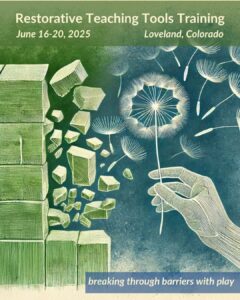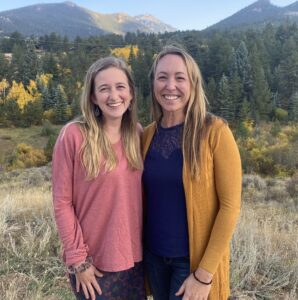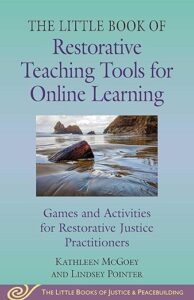
Restorative Teaching Tools Trainings
In-Person Restorative Teaching Tools Training (June 16-20, 2025)

Join us for an immersive 3-day Restorative Teaching Tools training designed for restorative justice practitioners, trainers, and educators seeking to diversify their teaching methods. This in-person training will equip you with innovative strategies, activities, and games to transform your trainings and classes into highly engaging, interactive experiences that foster deep connections and stimulate meaningful dialogue.
This training will empower you to design impactful learning experiences in the field of restorative justice.
You will gain a toolkit of games and activities and learn the art of designing your own experiential activities to meet your community’s learning needs.
All training sessions, meals, and accommodations will be provided on site. Sunrise Ranch in Loveland, Colorado is a beautiful remote mountain setting that offers an opportunity for reflection and rejuvenation while building new connections, learning new skills, and having fun!
Dates
June 16-20, 2025
- Check-In: June 16th from 2-5pm. Dinner at 6pm followed by a welcome gathering.
- Check-Out: June 20th by 11am. Lunch provided at 12pm.
Prerequisite
We request that training participants have foundational understanding and experience with restorative justice and restorative practices prior to participating in this training. The focus of this course is learning to facilitate activities to teach restorative principles and skills. Therefore, a preexisting knowledge of restorative justice principles and practice is necessary.
Cost
Training Registration (3 day training): Sliding scale $1,200-$1,500
Accommodation (4 nights) & Meals (12 meals): Varies from $312 (Commuter) to $856 (Single room in shared apartment).
Registration Instructions
- Step 1: Register for Training here
- Step 2: Register for Accommodations here
* You must follow Steps 1 & 2 to complete your registration.
Registration Deadline: April 24, 2025
Information on traveling to Sunrise Ranch in Loveland, CO.
Contact Us with questions.
Meet Your Facilitators
This training is facilitated by Kathleen McGoey and Lindsey Pointer, authors of The Little Book of Restorative Teaching Tools (Good Books, 2020) and The Little Book of Restorative Teaching Tools for Online Learning (Good Books, 2024).

Kathleen McGoey is a trainer and facilitator of restorative justice practices & conflict transformation. She has an MA in International Peace & Conflict Studies from the University of Innsbruck, Austria, and is the former Executive Director of Longmont Community Justice Partnership (LCJP), where she led community restorative justice programs. Kathleen was first drawn to peacebuilding while working on the U.S.-Mexico border, where she coordinated a service-learning program in Tijuana. In addition to the Restorative Teaching Tools books, Kathleen is the author of Harmonizing Heavens and Earth: A Daoist Shamanic Approach to Elicitive Conflict Transformation (Lit Verlag, 2013).
Lindsey Pointer is an Assistant Professor at Vermont Law and Graduate School and Principal Investigator of the National Center on Restorative Justice. She has a PhD in Restorative Justice from Victoria University of Wellington in New Zealand and is a former Fulbright Fellow and Rotary Global Grant recipient. Lindsey has worked as a restorative justice facilitator, community program manager, educator, and researcher. In addition to the Restorative Teaching Tools books, Lindsey is the author of The Restorative Justice Ritual (Routledge, 2021), and a children’s picture book about restorative justice, Wally and Freya (Good Books, 2022).
Gilbert Salazar 
Kathleen and Lindsey will be joined by Gilbert Salazar, who will facilitate a series of three workshops over the course of the three-day training. These workshops will incorporate modalities of applied theater, somatic and sensorial work, and arts-based methodologies for reflection and connection. Gilbert Salazar’s work lies in the intersection of community, culture-building and leadership, storytelling and story development, ritual, and theater for healing and liberation. Gilbert has worked in the field of Restorative Justice in schools where he has provided trainings, coaching and curriculum development. Gilbert offers liberatory coaching to educators, artists and practitioners. Gilbert is also a playwright and has produced his first short film, ‘Sippin’’ based on the excerpts of the play in his chapter for Colorizing Restorative Justice.
Gilbert uses applied theater techniques and trauma informed strategies in his work as a Restorative Justice trainer, university lecturer, and artist. He is currently enrolled in a doctoral program in Depth Psychology with a specialization in Communal, Liberation, Indigenous and Eco-psychologies at Pacifica Graduate Institute.
Dip Your Toe!
Are you considering joining us for the Restorative Teaching Tools Training in June?
Join us for a free one-hour online workshop to get a taste of our in-person training. We will facilitate one or two favorite activities from our books.
Restorative Teaching Tools – Dip Your Toe Workshop – February 25, 2025
Restorative Teaching Tools – Dip Your Toe Workshop – April 3, 2025
Online Restorative Teaching Tools Training

Upcoming dates TBD.
This training introduces experiential games and activities that are intentionally designed for online learning spaces, giving participants an experience of material from The Little Book of Restorative Teaching Tools for Online Learning (2024). It builds upon the core concepts of restorative pedagogy introduced in The Little Book of Restorative Teaching Tools (2020) to overcome perceived limitations of virtual training and lean into the tools and possibilities that are unique to online spaces to create meaningful, engaging restorative learning environments.
Participants will:
- Experience games and activities to help you facilitate genuine relationship-building, understand the restorative justice paradigm, build confidence using restorative skills, and deepen understanding of structural injustices in restorative justice processes.
- Receive guidance for how to overcome common challenges in online learning spaces such as a lack of informal time to socialize, attention fatigue, and limited opportunities for movement.
- Have fun!
This training is for you if:
- You have a baseline understanding of restorative justice principles and practices.
- You want to improve your ability to lead interactive learning activities in a virtual setting.
- You are curious about restorative pedagogy, or methods for teaching restorative justice that align with restorative values.